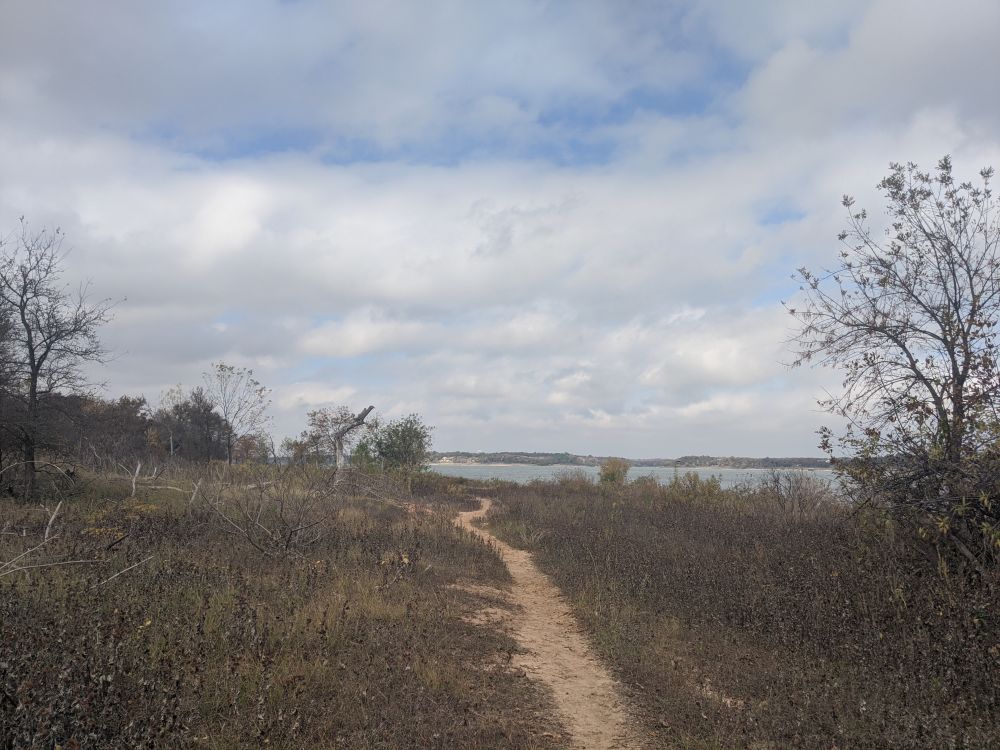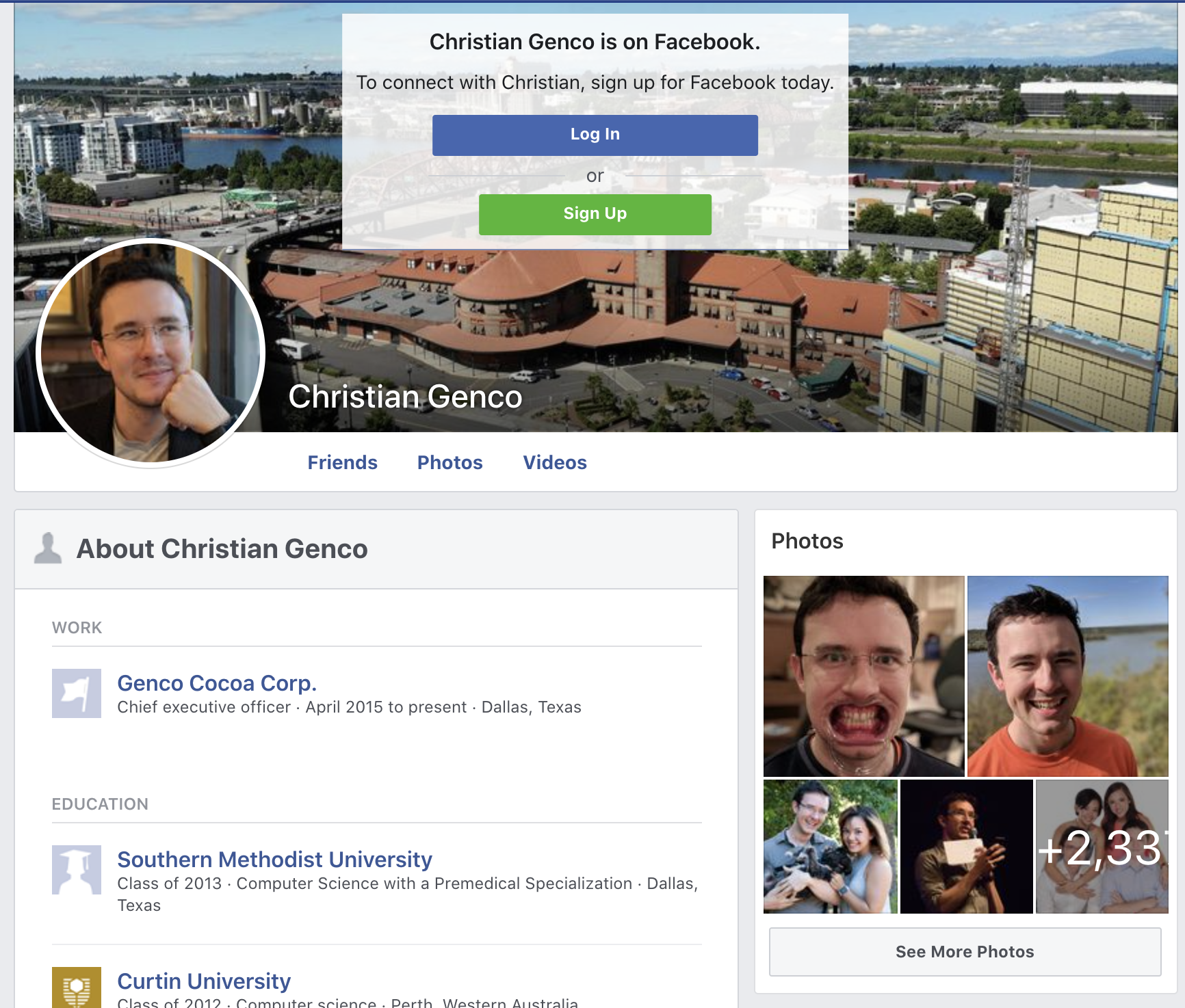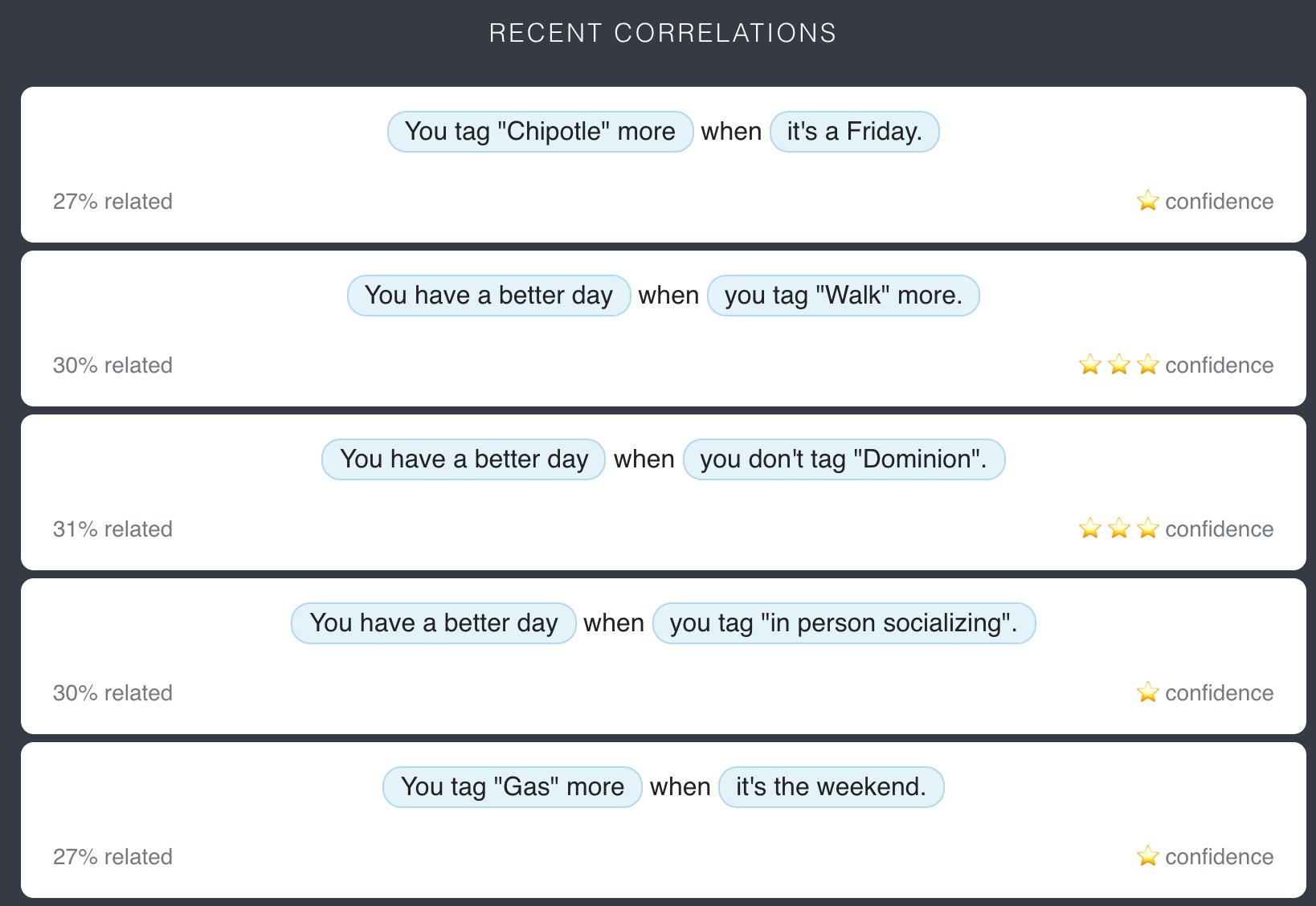
Here's what I've been working on and thinking about last month.
If you'd rather hear words come through my beautiful face instead of reading, watch this video recap instead:
1. Social and fun #
Virtual Reality #
I got an Oculus Quest II Virtual Reality headset and it's incredible. The sense of presence you get interacting with someone remotely in VR solves so many of the problems I was thinking about with staying connected virtually in August-ish. You can see whre people are looking, read their gestures, interact with them in a space that feels physical—it's amazing.
I've been using this new tech to stay connected with my siblings and would love to pressure you into getting one so you can come to one of my upcoming virtual movie nights working through the 100 best films of all time. Try one if you can—so far about 70% of people I've demo'd this headset to have bought one. I think the Oculus Quest II is going to do a lot to bring VR to the mainstream.
Restarting socially in Dallas #
This month I restarted climbing, yoga, and dancing in Dallas; started an in-person meditation class; and went to my first monster jam rally.
It feels great and socially healthy to be connecting with the world again, but I'm struggling to find a stable position for when it's ethically okay to be re-engaging in an in-person social life.
Is it my personal responsibility to research how I need to be acting to minimize societal damage? This is a commendable ideal, but the implications of the number of my life choices I'd need to deeply reevaluate is paralyzing. Additionally, I'd like to be focused more on maximizing my positive output (which is unlimited) than minimizing my negative output (which is finite).
Is it okay for me to just be going along with what the culture I'm in is doing? Throwing responsibility on the people around me seems like something an asshole would do. I'd like to be a person capable of making decisions of morality independently even when everyone around me is making a mistake, especially when my actions have the potential to do a disproportionate amount of harm, but on what basis do I figure out what the correct thing to do is for COVID?
I'd love to know how you make these types of decisions.
In parallel with these concerns, I'm academically curious to see the result of different states' and countries' COVID philosophies. Will the short-term economy-over-public-health strategy of Texas win out over the long-term lock-everything-down strategy of the UK and Canada? How might you measure success?
Dating and fitness coaching #
In the spirit of trying to figure out ways to spend money that make more money (re-inspired by playing Cashflow last month), I'm experimenting with hiring coaches.
My body composition analysis
The fitness coach I had a consultation with gave me this super interesting body assessment that blew my mind (I'm just a sack of 110.7 pounds of water!), but I don't think it's going to make sense for me. The trainer wants $700/month with a three-month minimum commitment for 5 sessions a month. I think a necessary prerequisite for making that level of time and money investment is tracking macronutrients. The feedback I got was that I was on the right track and would need to be eating about 2.5x more protein to be gaining muscle mass.
My public Facebook profile shows pictures of me with my ex wife and I can't change it
I also got a dating profile assessment with the advice to hide pictures of me with my ex when people search for me on Facebook. For the life of me I can't figure out how to do this, and I'm not confident this is important.
The call I had with Natalie at Apollonia Ponti was encouraging! I've been curious specifically about where makes the most sense to be directing effort in dating. Where in the funnel do I focus energy? Do I need to hire a photographer for better dating pictures, or do I need to book more therapy sessions to deal with my childhood trauma? Natalie's advice was that doing the deeper long-term work is always a good idea and to look at dating apps as fun low-stakes experiments to learn about what I like and don't like in partners, and to track the type of woman I find myself attracted to.
2. Projects #
TextbooksPlease.com #
TextbooksPlease is back online! The archetecture is beautiful and elegant and I loved working on it. The next bit of work on Textbooks Please is in marketing in January, which I have a few ideas for after chatting with Chris Achard on makers.dev episode 2:
- make "how do I find my textbooks at X univerity" or "X university textbooks" landing pages and videos
- facebook ads
- reddit ads
Fileinbox serverless beta #
The first step of transitioning Fileinbox to serverless architecture on Firebase is done! I have a working beta.
I'll be spending next month polishing this with the goal of getting at least one Fileinbox customer switched over to the new serverless beta. I don't need this to be completely feature-complete from the current Rails infrastructure, I just need it to be a little better at receiving massive amounts of files all at once (which I have a few Fileinbox customers routinely hitting the upper limits of on the current infrastructure).
Video editing #
I'm abandoning foolishly making my own video editor and just using Final Cut Pro. FCP isn't able to give me the buttery smooth dream workflow I want, but with tips I learned from Ali Abdaal's Skillshare course on editing with Final Cut Pro X, it can get pretty close.
My main gripe with this setup right now is that my poor late 2016 13" MacBook Pro struggles with rendering 1080p video, so I need to transcode everything to smaller proxy media if I want to get through a video without FCP crashing every six minutes. I'm very optimistic that my Apple Silicon MacBook that I'm VERY EXCITED ABOUT is going to make this much easier.
I'm also curious about outsourcing video editing completely to another human. Video editing seems like it would be much more straightforward to outsource than coding.
Trigg's project is finished! #
I spent almost no time on this project this month! The thing I built worked (almost) entirely without me for five shows. It's cool to think that a little copy of some thoughts I had in August and September of 2020 are going to live on in his show making magical things happen.
I love starting projects, and I love even more finishing them.
3. Productivity #
Makers.dev #
This month I started a work-in-public accountability podcast with my friend Chris Achard, who's building MeetingPlace as a competitor to Meetup.
I have several monthly checkins between this monthly update and my mastermind, so it's nice to have a more frequent checkin. A week is a good amount of time to get one or two big things done.
Exist #
Exist finds coorelations in how the things I do affect the quality of my days
I feel like the Exist app is my digital parent. I have about twenty different things I track every day now and the app is able to coorelate how each thing I track ("did I sleep well? did I run? did I socialize in-person?") affect the quality of my days. It's also a nice don't-break-the-chain tracker.
Thank you Lianna Patch for the recommendation!
4. Health #
Weekly Planning #
I've continued my weekly planning habit from last month and it's going exceptionally well. This is another great tool to get a handle on the timescale of a week.
I'm finding it particularly helpful to have a dedicated moment to be planning for 8 days out. 8 days is a perfectly reasonable amount of time to ask for a call to be rescheduled and makes it easy to fit my high level goals into a day.
Something I've wanted for a while is a smooth flow to be able to go from life-scale goals (ex: "have children") to monthly goals (ex: "fix TextbooksPlease") all the way down to what I need to be doing right now to push my goals forward (ex: "call a local tire place to ask if they have four used tires for my car"), and I feel like weekly planning is playing a very important role in that process.
My first surgery #
Too many teeth
I booked my first ever surgery this month to get my wisdom teeth removed.
Since going to the dentist for the first time in over a decade two years ago (and getting my moderately severe periodontitis treated) I've been much more conscious of my oral health. After punting for three dentist visits, I got several opinions to check that getting my wisdom teeth surgically removed was the correct decision, then booked an appointment at the same place my sister got hers taken out last year.
This feels like a massive point of personal growth. It's taken me a long time to move forward on this problem decisively. I'm very proud that I was able to separate my anxiety from my rationality in figuring out what was preventing me from moving forward and getting it done.
I had two tactics in processing my anxiousness leading up to the surgery:
- I watched a WHOLE BUNCH of videos on how wisdom teeth removal works. I frequently hear people offering advice not to overthink something they're feeling worried about, but I don't feel like I have that choice. I need to understand as much of a spooky process as possible to feel confident about moving forward.
- I got super frustrated at the terrible and confusing surgery preparation and aftercare instructions, so I rewrote them to be clearer. The errors I saw made in the terrible instructions are the type of problem that Human Centered Design is particularly well suited to solve: instead of complaining that patient compliance is low, redesign your instructions to be easier to follow.
Actively listening to people you disagree with #
I took an improv class at the Dallas Comedy House in 2018 that left me with several valuable tactics for navigating the world.
One of those tactics is to never use "you're crazy!" as an explanation: in improv, it's much funnier to figure out a reason why someone's seemingly eratic behavior is actually perfectly justified.
Working to understand someone who seems crazy to you is an especially difficult practice when talking with someone you disagree with. It can feel like working to understand them is legitimizing and validating them, which can be dangerous if you believe their beliefs are actively harmful towards you.
Without mutual understanding, though, communication is impossible.
The best way to understand someone else is to actively listen to them: instead of immediately rejecting what they said, try to repeat back what you understand their perspective to be until they reply with "yes, exactly!" Until I can repeat someone's argument back to them better than they've expressed it, I'm not convinced I understand them yet.
This month I had a long discussion on twitter about active listening specifically as it relates to Trump supporters. I think it's an easy and justifiable position to take that people who support Trump are crazy, but I don't think that's a useful position to take if you're trying to communicate. This position is certainly useful to establish dominance, clarify sides, and signal virtues, but I'd like to think that people with different political views than me are still human and that this country isn't merely careening towards civil war.
A few days after this discussion I stumbled on a podcast episode from Sam Harris discussing his realization of why Trump might be appealing to his supporters that's precisely the sort of thinking that dismissing his supporters as "crazy" would block me from going through. Harris argues that the messages from the Left are rooted in shame: "the crimes of slavery and colonialism are on your head, and if you're a cis white heterosexual male you're a racist, homophobic, transphobic, Islamophobic, sexist barbarian."
Trump, in contrast, is "a bundle of sin and gore and he never pretends to be anything more. He can't possibly judge you. He's fat Jesus."
Broken down to that level, I totally get it. I'm frequently in situations where I choose an option that's worse for me in the long term but enables me to feel better about myself in the short term. That's a human process I can totally relate to.
Getting to the point where I can express this perspective to someone I disagree with in their own words in a way that they respond "yes, exactly!" isn't just a way to communicate in a healthier way, it's a process of understanding the most shameful parts of myself better.
5. Next month #
Part-Time YouTuber Academy #
I'm enrolled in Ali Abdaal's Part-Time YouTuber Academy and I'm very excited to go through it this next month. My goal in the course is to smooth out my pipeline of publishing "YouTube-Guru"-style videos so I can start churning out polished, condensed, and easily-sharable versions of my work and thoughts on life improvement strategies.
Creating a YouTube presence is a project I've been wanting to push forward for the last several years, and it feels like this course will help smooth out the last remaining points of resistance to start consistently building something great.
180 Minutes/week on Fileinbox #
My goal for Fileinbox of having a way to send files through the serverless architecture did push Fileinbox forward, but in the most minimal way possible.
Because I'm doing rigorous time tracking it's trivially easy for me to set and measure time-based goals, so this next month I'd like to be spending at least 180 minutes per week of focused work on Fileinbox.
Tags on Midnight #
To make tracking time-based goals easier, and to implement the most requested feature from my beta users, I'd like to implement tag-based tracking on my Midnight time tracker. This feature is half implemented already, so this should be pretty easy to knock out.
Redo this website #
This website has felt stale recently. I don't love how it's laid out, and would love to blatantly copy some of the blogs I like better: James Clear, Derek Sivers, and Ali Abdaal.
Launch an interview podcast? #
I've been having some great chats with Shai Schecter about mindfulness and stoicism that I'd love to be sharing, and I'm not sure the best medium for this. Do they get put up as YouTube videos on my main channel? Do I make a new channel for this type of interview? Do I start something with just Shai?
I'd love to have a stream of content that made it easier to reach out to authors of books I like to record and publish interviews with them, and this might look like a podcast that starts with some of the conversations I've had with Shai.